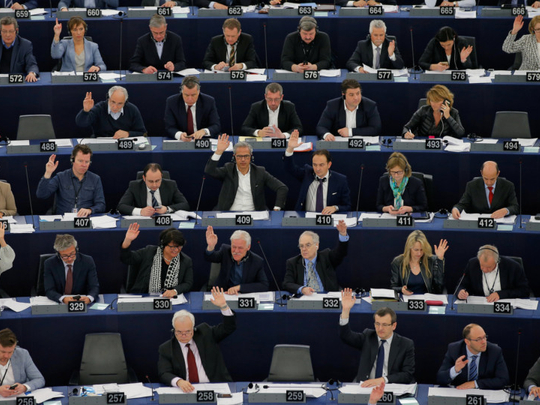
Last month was another cruel one for Europe, culminating in the horrific terrorist attacks in Brussels on March 22. The aftermath has seen a new round of soul searching, with Europeans mulling over the European Union’s (EU) institutional failures and sheer incompetence, not to mention the existential challenge it currently faces.
Such considerations seem to arise frequently these days, as Europe encounters a seemingly endless series of emergencies, from the Greek crisis to the influx of refugees. Yet, complacency remains the order of the day, with EU leaders adopting to a crisis-response mentality that privileges reaction over action and perpetuates the cycle of destabilisation.
The fact that crises have become the EU’s new normal has reinforced the notion, already ubiquitous among Europhiles and Eurocrats, that we will simply continue to muddle through. This approach is both misguided and dangerous.
As it stands, European unity is disintegrating rapidly. The just-concluded referendum in the Netherlands, in which Dutch voters overwhelmingly rejected an association agreement between the EU and Ukraine, is merely the latest example. If the EU is to survive this slow-motion train wreck, let alone thrive in the long run, bold action — not just valiant rhetoric — is urgently needed.
It is time to decide whether the EU is a truly transnational undertaking or merely a vessel for inter-governmental arrangements. If it is the latter, we should call a spade a spade. But, in that case, one should understand that both the EU and individual countries are effectively resigning themselves to increasing irrelevance. Paying little more than lip service to a common approach in critical areas leaves problems unaddressed and opportunities unexplored. Simply put, with an “every man for himself” approach, everyone will sink.
A transnational undertaking is the superior option. But it is also the more difficult one, because it demands deep and fundamental changes in how the question of European integration is approached.
The original sin of the European project is that, Brussels notwithstanding, there is no European constituency. Events, policies, and challenges are all viewed through a national lens. The refugee crisis has brought this into sharp relief; but every stress on the European system brings to the fore nationalist perspectives.
And why shouldn’t this be the case? After all, political accountability — not to mention tax money — flows from citizens to the national capitals. But the split between the EU and national governments is a false one. Subsidiarity, properly applied and understood as decision-making power at the appropriate level of government, is and must remain a guiding principle of European action. There are, however, times when collective action is needed. For such action to be effective, the EU level cannot be a place for scapegoating and bloviating.
National political figures cannot continue to claim that Brussels or the European Commission is the source of all their problems, and pursue self-centered and shortsighted measures that ultimately exacerbate crises. Nor can EU officials continue to shrug their shoulders and blame national politicians for failing to implement proposed EU-wide measures. Instead, the EU needs real authority to execute policy.
One Brussels insider recently noted to me that the EU, propelled by its crises, is already entering a new phase of empowerment, where it, not its member states, has real implementing authority. And, indeed, there are assorted examples of the EU assuming something of an executive position; notably, the EU is expected to play a leading role in implementing its recent deal with Turkey to resolve the refugee crisis.
But a genuine and legitimate shift to an effective EU executive requires a stronger connection between the people and those acting on their behalf. In other words, Europe must create a transnational constituency.
This is not a new idea. There has long been support for the idea of European citizenry, and the EU treaties include provisions that could serve as stepping stones to this end. But limited progress on this front reflects popular sentiment. In the five years since Eurobarometer began asking survey participants whether they feel like citizens of the EU, the number responding positively has increased by only 2 per cent (from 62 per cent in 2010 to 64 per cent in 2015).
Deepening the political links among Europeans requires institutional reform based on collective action, awareness, and ownership. The seeds of such an endeavour — from replacing the elegant but bloodless Spitzenkandidaten system with direct EU-wide elections for European Commission President to considering a limited but direct EU tax to establish a clear line of accountability — are already available.
Such efforts would certainly face serious political headwinds; the current system is, after all, quite comfortable for many. But the process of unraveling is already underway. Only a conscious European citizenry can weaken the centrifugal forces that emerge in every crisis, because only such a citizenry can ensure accountability at the EU level, compel officials to formulate and execute effective policy, and thereby break the cycle of blame that has become entrenched in European decision-making. Creating this awareness would be a long-term process, but it is essential.
At a time of such difficult challenges, strengthening transnationalism might seem extreme and unachievable. But unless the EU recognises the real reasons that continue to be battered by crises, it will be doomed to continue muddling through until there is no EU left.
— Project Syndicate, 2016
Ana Palacio, a former Spanish foreign minister and former senior vice-president of the World Bank, is a member of the Spanish Council of State and a visiting lecturer at Georgetown University.








